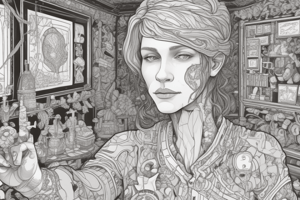Podcast
Questions and Answers
What is the primary focus of psychiatry?
What is the primary focus of psychiatry?
- To perform surgical procedures on patients.
- To conduct neurological research only.
- To develop new medications for physical diseases.
- To diagnose, treat, and prevent mental disorders. (correct)
Which of the following is an example of a mental disorder?
Which of the following is an example of a mental disorder?
- Diabetes
- Asthma
- Hypertension
- Bipolar disorder (correct)
What criteria are commonly used for diagnosing mental disorders?
What criteria are commonly used for diagnosing mental disorders?
- DSM-5 or ICD-10 criteria. (correct)
- Physical examination results only.
- Hospital admission records.
- Genetic testing results.
Which treatment modality involves the use of talk therapy?
Which treatment modality involves the use of talk therapy?
What specialization in psychiatry focuses on mental health issues in older adults?
What specialization in psychiatry focuses on mental health issues in older adults?
What is a common assessment tool used in psychiatry?
What is a common assessment tool used in psychiatry?
Which of the following is an ethical consideration in psychiatry?
Which of the following is an ethical consideration in psychiatry?
What future direction in psychiatry involves integrating technology?
What future direction in psychiatry involves integrating technology?
Flashcards are hidden until you start studying
Study Notes
Overview of Psychiatry
- Psychiatry is a branch of medicine focused on diagnosing, treating, and preventing mental disorders.
- It integrates biological, psychological, and social factors in mental health.
Key Concepts
-
Mental Disorders:
- Conditions that affect mood, thinking, and behavior.
- Examples: Depression, anxiety disorders, schizophrenia, bipolar disorder.
-
Diagnosis:
- Utilizes criteria from the DSM-5 (Diagnostic and Statistical Manual of Mental Disorders) or ICD-10 (International Classification of Diseases).
- Involves mental health assessments, interviews, and sometimes physical examinations.
-
Treatment Modalities:
- Psychotherapy:
- Talk therapy methods like cognitive-behavioral therapy (CBT), dialectical behavior therapy (DBT), and psychodynamic therapy.
- Pharmacotherapy:
- Use of medications like antidepressants, antipsychotics, mood stabilizers, and anxiolytics.
- Other Interventions:
- Electroconvulsive therapy (ECT), transcranial magnetic stimulation (TMS), and lifestyle modifications (diet, exercise).
- Psychotherapy:
Specializations in Psychiatry
- General Psychiatry: Broad practice dealing with various mental health disorders.
- Child and Adolescent Psychiatry: Focus on younger populations; considers developmental stages.
- Geriatric Psychiatry: Addresses mental health issues in older adults.
- Forensic Psychiatry: Intersection of mental health and legal issues, often involving competency evaluations.
- Addiction Psychiatry: Treatment of substance use disorders and related behaviors.
Common Assessment Tools
- Clinical interviews.
- Psychological testing (e.g., MMPI, Beck Depression Inventory).
- Standardized rating scales for specific disorders.
Important Changes and Considerations
- Stigma surrounding mental health must be addressed.
- The role of culture in mental health perception and treatment.
- Advances in neuroimaging and genetics are shaping future psychiatry.
Ethical Considerations
- Informed consent for treatments.
- Confidentiality and privacy of patient information.
- Balancing patient autonomy with treatment needs.
Future Directions
- Integration of technology (telepsychiatry, apps).
- Personalized medicine approaches.
- Ongoing research into mental health disorders and effective treatments.
Overview of Psychiatry
- Psychiatry focuses on diagnosis, treatment, and prevention of mental disorders.
- Mental health is a combination of biological, psychological, and social factors.
Mental Disorders
- Affect mood, thinking, and behavior.
- Examples include depression, anxiety disorders, schizophrenia, and bipolar disorder.
Diagnosis
- Uses criteria from the DSM-5 or ICD-10.
- Involves mental health assessments, interviews, and sometimes physical examinations.
Treatment Modalities
- Psychotherapy:
- Talk therapy methods like CBT, DBT, and psychodynamic therapy.
- Pharmacotherapy:
- Use of medications like antidepressants, antipsychotics, mood stabilizers, and anxiolytics.
- Other Interventions:
- ECT, TMS, and lifestyle modifications.
Specializations in Psychiatry
- General Psychiatry: Broad practice dealing with various mental health disorders.
- Child and Adolescent Psychiatry: Focus on younger populations; considers developmental stages.
- Geriatric Psychiatry: Addresses mental health issues in older adults.
- Forensic Psychiatry: Intersection of mental health and legal issues, often involving competency evaluations.
- Addiction Psychiatry: Treatment of substance use disorders and related behaviors.
Common Assessment Tools
- Clinical interviews.
- Psychological testing (e.g., MMPI, Beck Depression Inventory).
- Standardized rating scales for specific disorders.
Important Changes and Considerations
- Stigma surrounding mental health must be addressed.
- Culture plays a role in mental health perception and treatment.
- Advances in neuroimaging and genetics are shaping future psychiatry.
Ethical Considerations
- Informed consent for treatments.
- Confidentiality and privacy of patient information.
- Balancing patient autonomy with treatment needs.
Future Directions
- Integration of technology (telepsychiatry, apps).
- Personalized medicine approaches.
- Ongoing research into mental health disorders and effective treatments.
Studying That Suits You
Use AI to generate personalized quizzes and flashcards to suit your learning preferences.




